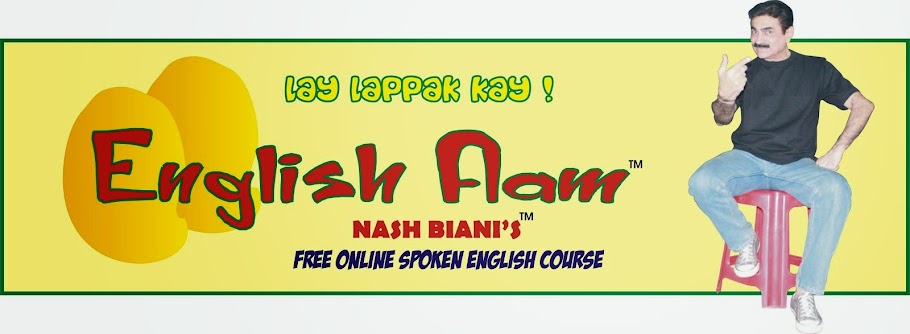Posted by Nash Biani
ABSOLUTE BEGINNER COURSE
SPOKEN ENGLISH
Lesson 6
(Page 1)
English Grammar: Possessives
my-our-your-their-his-her-its-their
Section I
As we go through our day speaking English, there will be many occasions to use possessives. Right from the time we open our eyes in the morning, we start using these words. Let's take a few examples: 'I'm brushing my teeth.' 'I've had my breakfast.' 'Come on! We'll miss our bus!'
'Papa has forgotten to take his mobile with him again.' 'She's at her office.' 'His exams start next week.' 'The company is opening its new branch tomorrow.' 'The puppy is chasing its own tail.' 'She's talking with her mother on the phone.' 'I don't have his email address.' 'Can I have your mobile number?' 'What's your name?' 'Those are their children.''They want to sell their old car.' 'It's their wedding anniversary today.'
So you see, we use these words all the time. I could keep on giving you examples which you will find you use in your daily conversations when you speak English. We need to understand the proper use and pronunciation of these words,
In English grammar, the words my-our-your-their-her-his-its can be said to be possessive determiners or possessive adjectives. But, as I always say, let's not get bogged down in grammar definitions. We should just know what role these words play in spoken English. The best way to understand this is to look at some translations.
In a restaurant, you could ask the waiter, 'Can I have my bill please.' In Hindi-Urdu, this will be, 'Krupya mera bill dijiye.'
You book an order for some medicines over the phone and need to send them to the customer and you ask,'What's your address?' This will translate as,'Aapka pata kya hai.'
Your daughter has been playing outdoors and her hands are dirty.In spoken English, it's 'I have to wash her hands.' In Hindi-Urdu we say,'Mujhe uske haath dhoney hain.'
When speaking English,'That's his car.' In Hindi-Urdu,'Woh uski gaadi hai.'
You talk about someone's shop,'Their shop is in Mumbai.' In Hindi-Urdu we say,
'Unki dukaan Mumbai mein hai.'
The use of possessives - my,our,your,his,her,its,their - in spoken English
As we go through our day speaking English, there will be many occasions to use possessives. Right from the time we open our eyes in the morning, we start using these words. Let's take a few examples: 'I'm brushing my teeth.' 'I've had my breakfast.' 'Come on! We'll miss our bus!'
'Papa has forgotten to take his mobile with him again.' 'She's at her office.' 'His exams start next week.' 'The company is opening its new branch tomorrow.' 'The puppy is chasing its own tail.' 'She's talking with her mother on the phone.' 'I don't have his email address.' 'Can I have your mobile number?' 'What's your name?' 'Those are their children.''They want to sell their old car.' 'It's their wedding anniversary today.'
So you see, we use these words all the time. I could keep on giving you examples which you will find you use in your daily conversations when you speak English. We need to understand the proper use and pronunciation of these words,
In English grammar, the words my-our-your-their-her-his-its can be said to be possessive determiners or possessive adjectives. But, as I always say, let's not get bogged down in grammar definitions. We should just know what role these words play in spoken English. The best way to understand this is to look at some translations.
In a restaurant, you could ask the waiter, 'Can I have my bill please.' In Hindi-Urdu, this will be, 'Krupya mera bill dijiye.'
You book an order for some medicines over the phone and need to send them to the customer and you ask,'What's your address?' This will translate as,'Aapka pata kya hai.'
Your daughter has been playing outdoors and her hands are dirty.In spoken English, it's 'I have to wash her hands.' In Hindi-Urdu we say,'Mujhe uske haath dhoney hain.'
When speaking English,'That's his car.' In Hindi-Urdu,'Woh uski gaadi hai.'
You talk about someone's shop,'Their shop is in Mumbai.' In Hindi-Urdu we say,
'Unki dukaan Mumbai mein hai.'
Let's join our spoken English mehfil and speak together
click on the video and participate in the English Aam Mehfil Video Lesson
LESSONS IN ABSOLUTE
BEGINNER COURSE
CHAPTER 1
|

No comments :
Post a Comment
Note: only a member of this blog may post a comment.